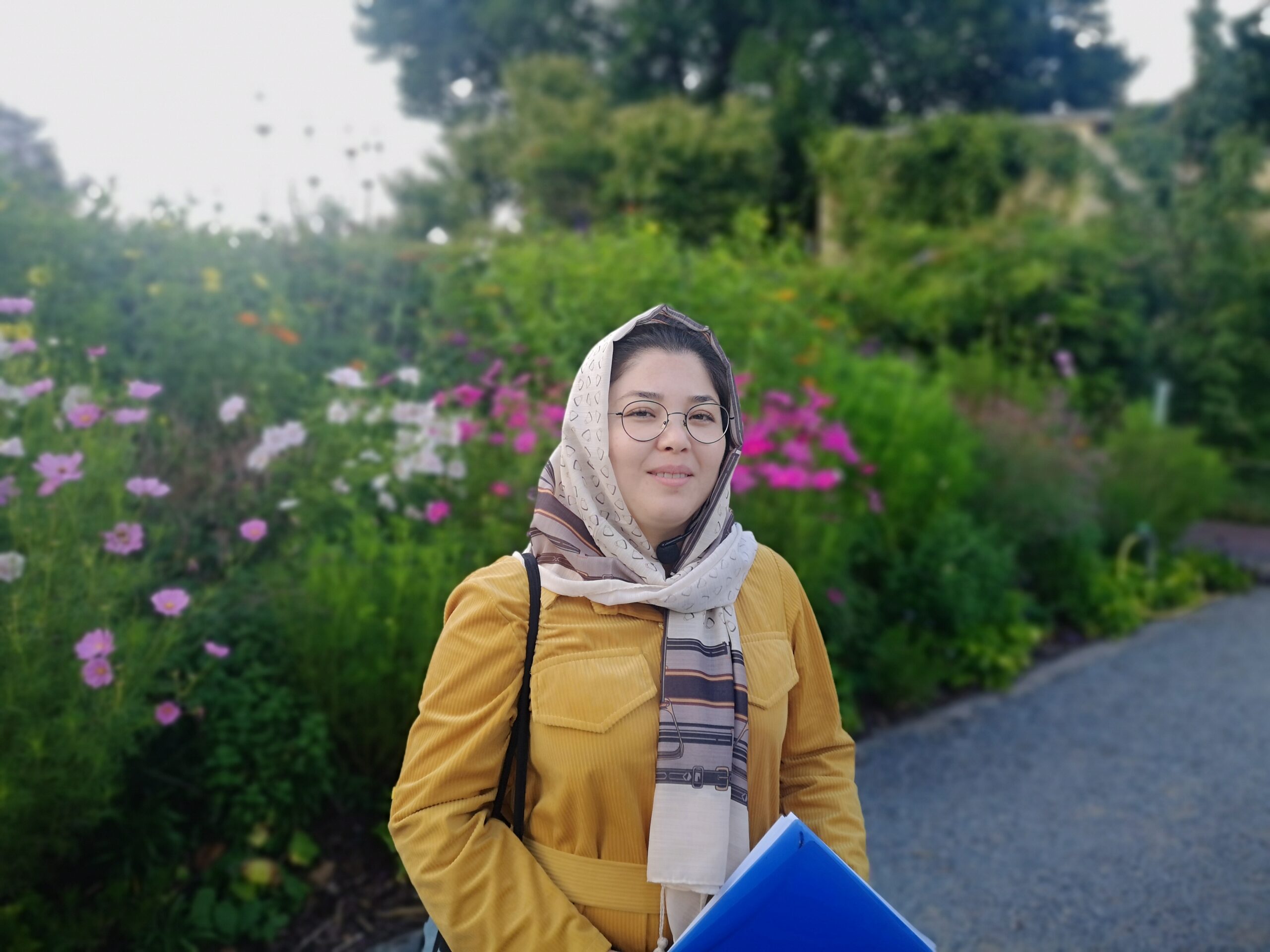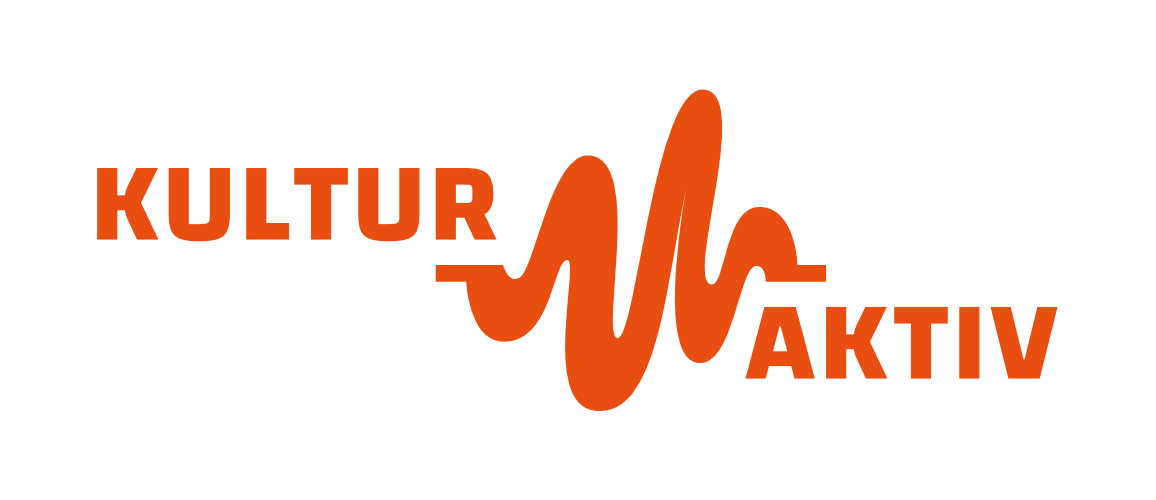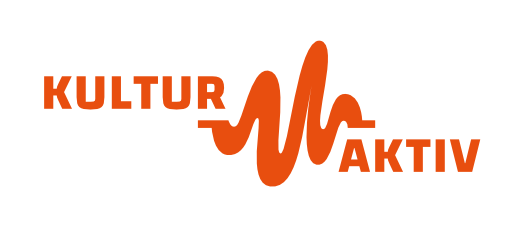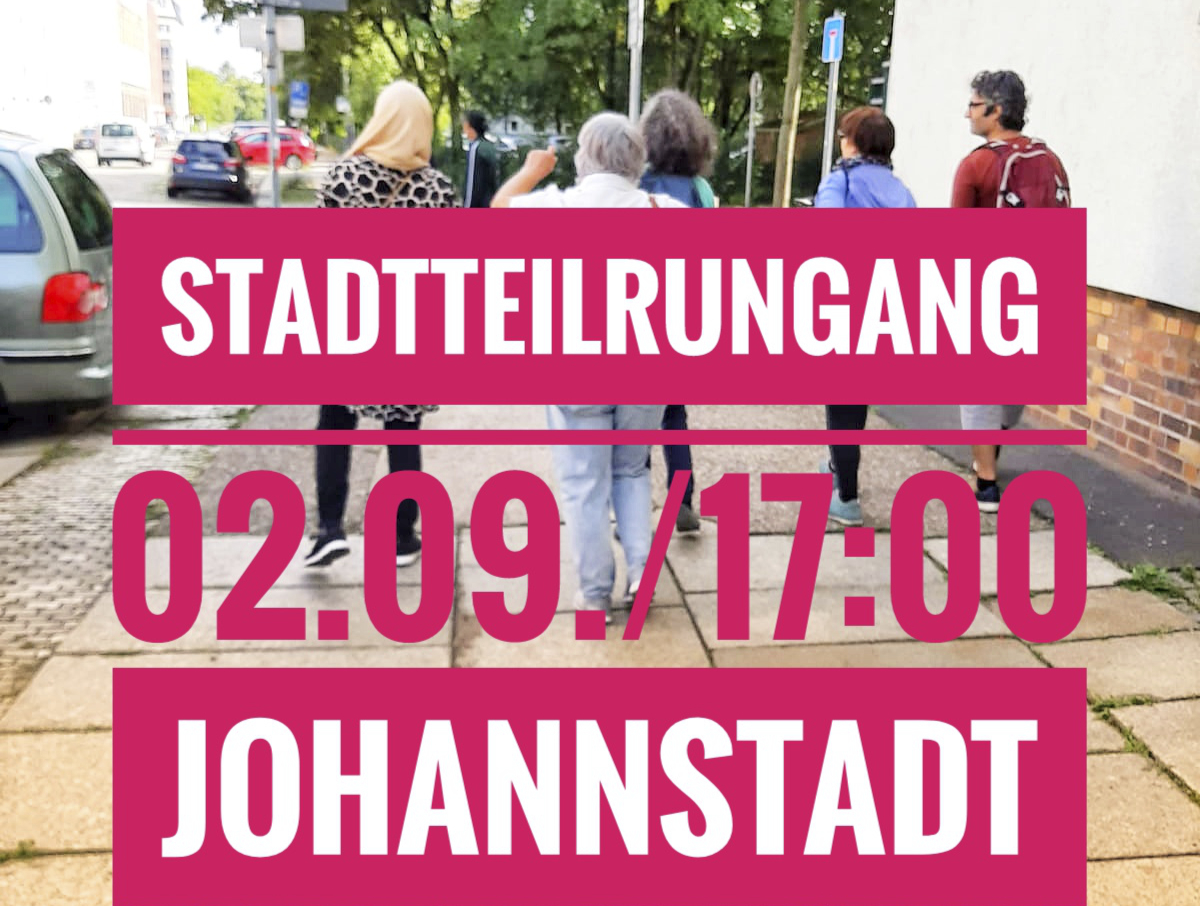On 02 September, the Dresdner Nachbarschaften went on a discovery tour in Johannstadt. The meeting point for the walk through Johannstadt is at Straßburger Platz. The noise level at the busy intersection is high. Fortunately, Zahra has a small amplifier for her voice. She is a participant in an equal opportunities project run by the Ausländerrat Dresden e.V.
text: Uta Rolland, Ivana Pezlarova · photos: Yvonn Spauschus
The project „Dresdner Migrationsgeschichten: Frauen*stimmen sichtbar machen!“ offers biographical city tours from an unusual perspective. Women* with experience of flight and migration share their view of the city, tell their personal stories and explain the topics of gender equality, flight and arrival from a female perspective. Zahra came to the project two months ago. She is accompanied by Anke, a 21-year-old student. Anke is a tour guide whose job is to support the city guides* in carrying out their tours according to their individual needs: Sometimes linguistically, sometimes organisationally. Anke is happy about this kind of voluntary work, in which women* with migration experience can act as experts on their own behalf, share their knowledge and improve their German skills.

The project was funded by the Saxon State Ministry of Justice and for Democracy, Europe and Equality and by the Heidehof Foundation.
Zahra is 35. She was born and raised in Iran, but comes from Afghanistan. She has lived in Germany with her husband and son since 2017, and in Dresden since 2019. At the entrance to the Botanical Garden, one of her favourite places in Dresden, she talks about her studies in horticulture, which have not yet been recognised in Germany. She explains the lengthy process of recognising foreign degrees, which can take several months, sometimes even years. This requires various prerequisites that are not easy to fulfil. One hurdle, the B2 language exam, is still waiting for her.
At stops such as the Marwa El-Sherbini Cultural and Educational Centre Dresden in Marschnerstrasse, participants learn, for example, some of the differences between the Shiite and Sunni secessions of Islam, as well as the story of Marwa El-Sherbini, who was murdered in Dresden 13 years ago for racist reasons. Zahra stops at an adjacent playground and shares her story. It is important to Zahra to remember Marwa as well as to draw a parallel: she too was publicly racist attacked with her child in Dresden, as Marwa was at the time.
Her professional biography is impressive: when she was 17, the whole family with five children had to flee back to Afghanistan. To support her parents financially, she founded a hairdressing salon, which she ran successfully with three female employees, she had a driving licence and a car. All things that are no longer possible for women in Afghanistan since the Taliban took power in August 2021. Equality between women* and men* is a matter of course for Zahra, she grew up with such values. However, she is aware that there is still a long way to go before women* and men* have equal rights everywhere in the world. Zahra reports on the current situation and on the courageous Afghan women* who are standing up to oppression and shows a picture from this year in which demonstrating women* with banners can be seen.
On arrival at the Johannstädter Kulturtreff, we saw some of the district and learned interesting facts about Zahra’s eventful life. Some of it raises further questions. Her view of the district sensitises and changes our own familiar perspective. Which places are important for women* with migration experience and why? Are there places that remind you of your country of origin? It is nice that she has arrived well in Germany and Dresden with her family and feels part of society. Another project Ausländerrat Dresden, the meeting place “Café Halva”, has also contributed to this: there she has been able to get support and make first friends. There, migrant women* can contribute their talents and knowledge and act in a self-determined way.
Through the city tours, she has the opportunity to be a visible and audible part of a Dresden community in which she has a place with her tense history. For the future, she would like to have good career prospects and an open, respectful neighbourhood. She would prefer to live in Johannstadt, because she loves the water and its calming effect and would like to be by the Elbe much more often.
Anke, on the other hand, is very happy with her current place of residence near the university. One of her neighbours has not only become a best friend over time, but is also a reason not to move.
The project “Dresdner Migrationsgeschichten: Frauen*stimmen sichtbar machen!” (01.02.-31.12.2022, Ausländerrat Dresden e.V.) was funded by the Saxon Ministry of Justice, Democracy, Europe and Equality and the Heidehof Foundation.
Gläserne Manufaktur
Dresdner Nachbarschaften
Damals, Heute, Morgen / Zuhören, Erinnern und Gestalten
In unseren Erzählcafés und Gesprächsrunden, Stadtteilrundgängen und Workshops wollen wir euch ermuntern, Geschichten zu erzählen und Visionen zu entwickeln.
Zeitraum
05-12.2022
Projektbeteiligte
Yvonn Spauschus (Projektleitung)
Anne Ibelings · Moussa Mbarek · Nadine Wölk (Workshopleitung)
Uta Rolland · Rosa Brockelt · Rosa Hauch · Falk Goernert (Dokumentation und Moderation)
Kooperationspartner:innen
JugendKunstschule Dresden · Omse e.V. · Löbtop e.V. · Quartiersmanagement Prohlis, Johannstadt und Gorbitz · Sigus e.V. · In Gruna leben e.V. · UFER-Projekte Dresden e.V.
Gefördert durch

Das Projekt wird gefördert vom House of Resources Dresden+



